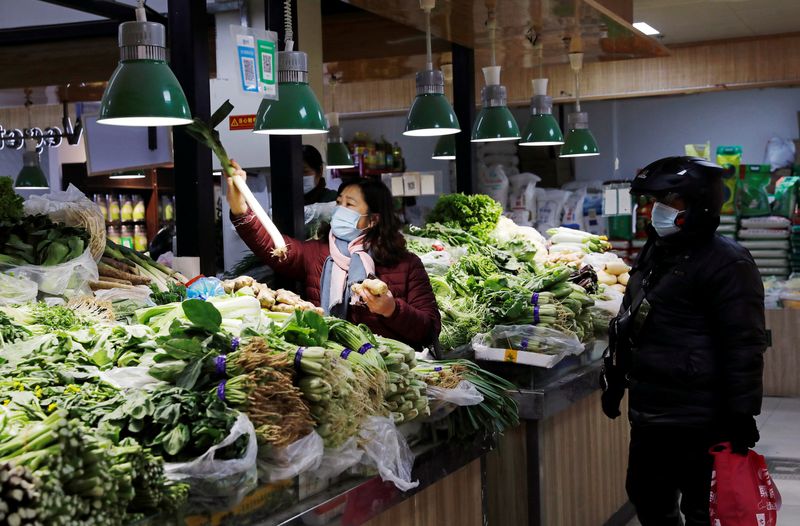China’s consumer inflation hits 18-month low amid uneven recovery
2023.04.10 22:30

© Reuters. FILE PHOTO: People wearing face masks shop at a market, following new cases of the coronavirus disease (COVID-19) in the country, in Beijing, China January 11, 2021. REUTERS/Tingshu Wang
BEIJING (Reuters) -China’s consumer inflation in March hit the slowest pace since September 2021, weighed by sluggish food prices, official data showed on Tuesday, suggesting demand weakness persists amid an uneven economic recovery.
Meanwhile, producer deflation sped up, extending price declines for a sixth straight month.
The consumer price index (CPI) for the month rose 0.7% year-on-year, compared with the 1.0% gain seen in February, said the National Bureau of Statistics (NBS). The result missed the forecast 1.0% rise in a Reuters poll.
“China’s March inflation report suggests that the Chinese economy is running a disinflation process, which points to bigger room for monetary policy easing to boost demand,” said Zhou Hao, economist at Guotai Junan International.
Food price inflation slowed to 2.4% year-on-year from 2.6% in the previous month. On a month-on-month basis, food prices fell 1.4%.
That pushed the CPI down 0.3% from a month earlier after a 0.5% fall in February, dashing expectations of no change.
The government has set a target for average consumer prices in 2023 to be about 3%. Prices rose 2% on year in 2022.
The producer price index (PPI) fell at the fastest pace since June 2020, down 2.5% year-on-year and compared with a 1.4% drop in February. That was in line with a forecast tipped in a Reuters poll.
The PPI remained flat from a month earlier, in line with the previous month’s rate.
Chinese policymakers have pledged to step up support for the economy, which recorded one of its worst performances in nearly half a century last year due to strict COVID-19 curbs.
Recent data showed China’s economic rebound remained uneven in March with the services sector seeing strong recovery but the sprawling manufacturing sector losing momentum amid still-weak export orders.
The country’s central bank cut banks’ reserve requirement ratio in March to support an economy facing headwinds including weak exports and the property downturn.
Beijing needs to “try every method” to stabilise exports to developed countries, Premier Li Qiang said on Friday, warning that the impact of the global slowdown on the domestic economy remains a key concern.








